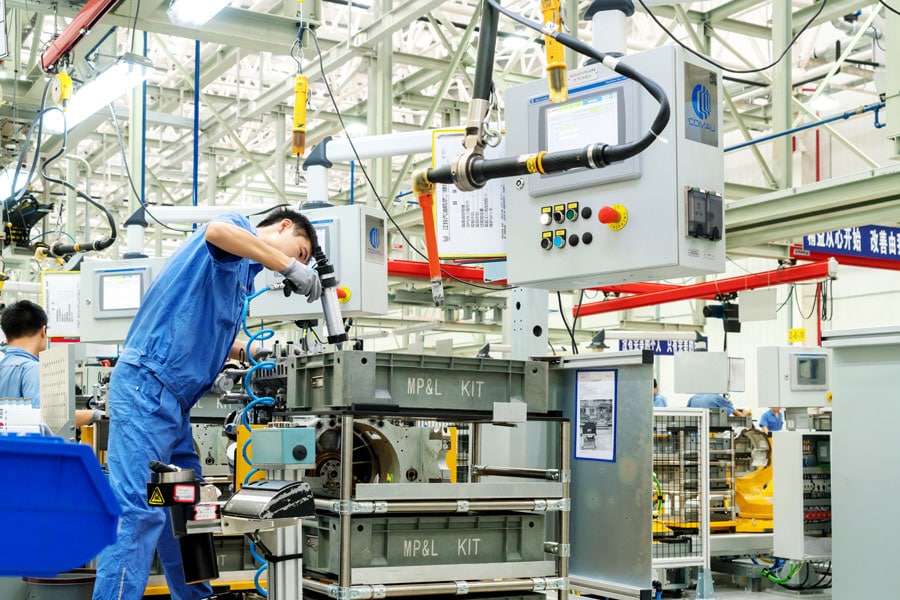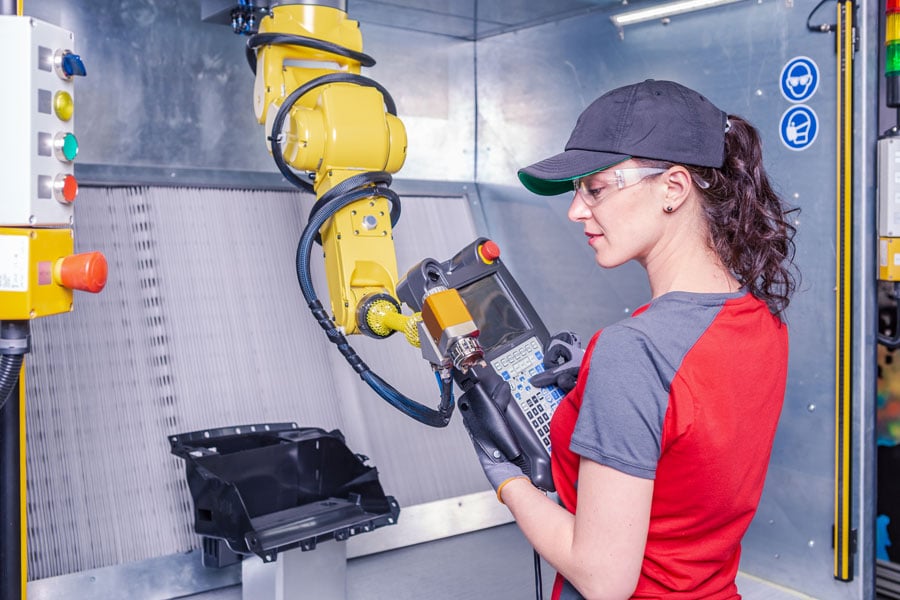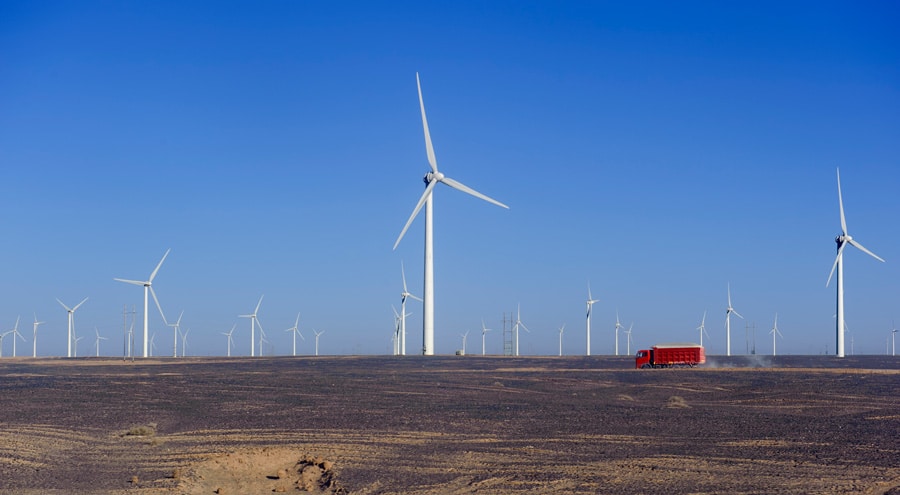How Industry 4.0 affects SMEs in Germany and China
Academics, politicians and manufacturers agree: we are at the dawn of a new industrial age which will transform our working and daily lives and propel us into the future at break-neck speed.
The first industrial revolution used water and steam-driven machines to create new production methods. The second introduced electric power and enabled mass production. The third added computers and automation technology to the manufacturing mix.
The fourth takes digital transformation to the next stage, combining technologies and connecting devices across the supply chain in an “Internet of Things” (IoT) and “Industrial Internet of Things” (IIoT).

This is only the beginning, but we can already do things faster, smarter and cheaper than ever before, thanks to more efficient production and logistics processes. We can transfer huge quantities of data over cloud-based networks which allow real-time monitoring of inputs, so we can also do things better, especially when it comes to the environment.
But every revolution has its downside. Whether jobs are lost when people are replaced by machines, factories close when technologies become outdated, or environmental damage is caused by over-consumption of resources, we pay a price for progress.
SMEs make up 99% of companies and 50% of the EU economy, and 98% of companies and 58% of the Chinese economy.
Research background
New research looks at how this latest industrial revolution – “Industry 4.0” – is regarded in two different parts of the world, Germany and China.
Led by Professor Dr Julian Müller from the Salzburg University of Applied Sciences in Austria and Professor Dr Kai-Ingo Voigt of Friedrich-Alexander University in Erlangen-Nürnberg in Germany, the study focuses on the benefits and challenges the revolution presents for small and medium-sized enterprises (SMEs).

Defined as businesses with up to 250 employees and annual turnover of up to 50 million Euro or 400 million Yuan, SMEs make up 99% of companies and 50% of the economy in the European Union (EU), and 98% of companies and 58% of the economy in China.
The research also looks at sustainability and how new developments can help businesses manage the economic, ecological and social impacts which make up the “triple bottom line” of sustainability – their annual summary of profit and loss which adds environmental and human measures to the financial perspective.
The German government launched its “Industrie 4.0” initiative to drive digital manufacturing forward and support research, standardisation and the networking of industry partners.
Also government-led, “Made in China 2025” was similarly launched to drive digital manufacturing forward, with the additional goal of sourcing 70% of core components and materials domestically by 2025, when it also aims to be the world’s leading industrial power.
Research into these initiatives has so far focused on their impact on large enterprises. A study of how they affect SMEs is therefore timely.
The study
The study is based on findings from a questionnaire completed by 222 SMEs in Germany and 107 in China in 2016/2017. Most were completed by chief executives or senior managers in mechanical and plant engineering, metal processing, electrical engineering, and information and communications technology.

In Germany, 55% of SMEs questioned believe that the current impact of Industry 4.0 is low. In China, a similar proportion, 50%, also believe that the current impact of Made in China 2025 is low. However, asked about the impact in five years’ time, Chinese SMEs expect Made in China 2025 to have a higher impact on their business than German SMEs expect of Industry 4.0. In China around a quarter think the impact will be low, whereas in Germany the figure is a third.
SMEs were also asked whether the initiatives are more relevant to larger companies. In the German sample, 45% of SMEs agreed with this statement. In China, the comparable figure was 18%, though 60% of SMEs were undecided.
The opportunities and challenges presented by Industry 4.0 and Made in China 2025 were also investigated, notably the economic, ecological and social factors that help to measure businesses’ sustainability in value creation.
Participants were asked to rate a series of statements on a five-point scale. The results indicate that overall, Chinese SMEs see greater potential for their businesses in these initiatives than German SMEs.
Regarding economic potential, the survey suggests that Chinese SMEs are more likely than German SMEs to think that the Industrial Internet of Things will drive competitive advantage and allow them to respond more individually to customers’ demands. More Chinese SMEs believe the new opportunities will help them to achieve greater efficiency and create new business models.

Regarding ecological benefits, the survey indicates that German SMEs are more likely to expect greater resource efficiency from combined technologies, whereas Chinese SMEs are more likely to expect greater energy efficiency. Opportunities for social benefits are envisaged as greater by Chinese SMEs, for example through employee assistance systems.
The threats perceived by businesses in both countries also present interesting insights. Chinese SMEs are more likely than German SMEs to believe that technological changes will challenge their businesses and result in job losses. On the contrary, German SMEs are more confident that the changes will help them to address skills shortages.
As for the sustainability of their businesses, Chinese SMEs are slightly more concerned about the viability of their business model than German SMEs, but they are equally concerned about the challenge of finding the right partners and suppliers.
SMEs in both countries are concerned about the need for an appropriate legal framework to support data security and exchange.
Chinese SMEs are more worried than their German counterparts about new competitors entering the market, and about having the financial resources to implement change.
SMEs in both countries are concerned about the need for an appropriate legal framework to support data security and exchange, with German SMEs rating data ownership and the need for encryption significantly higher than Chinese SMEs.
Implications
The research confirms that SMEs rate the current impact of Industry 4.0 and Made in China 2025 on their businesses as lower than for larger enterprises.

As a result, the study recommends that greater attention should be paid to the impact of Industry 4.0 on SMEs in Germany. It also raises concerns that German SMEs will miss out if they do not see its potential in helping to improve competitiveness and customise products to meet individual needs.
The study identifies opportunities for German SMEs to think more about how digitisation and interconnection can help them to become more energy efficient.
It also recommends that German SMEs should look further at potential employee benefits. For example, creating intelligent systems to help employees and designing workplaces that can integrate employee groups who are under-represented in SMEs, for example, apprentices, elderly and disabled people, and refugees.
For the German state the study suggests that greater attention is paid to concerns about data security and ownership, particularly employee and company data.
The report finds that Chinese SMEs see potential in all three dimensions of sustainability, particularly social benefits, but expect bigger challenges in implementation. To realise the potential, it suggests that concerns about competition, future viability and customer orientation need to be addressed, and new business models need to be created.
The report also recommends that China should provide solutions for SMEs’ lack of financial resources if it is to implement Made in China 2025 successfully. It also highlights the need to address both the decreasing number of jobs in manufacturing SMEs and the skills shortages and training demanded by the initiative.

Conclusion
Professor Dr Müller and Professor Dr Voigt’s work closes a research gap and takes a holistic view of the opportunities and challenges presented by Industry 4.0 for SMEs by studying all three dimensions of sustainability together, namely its economic, ecological and social impacts.
Their study also adds to the literature by looking at how different countries are approaching the new industrial revolution, comparing the thoughts of SME managers in one of the world’s most established industrial nations, Germany, with those in one of the world’s most ambitious industrial nations, China.
SMEs in both countries might like to remind themselves of a Chinese proverb: “When the winds of change blow, some of us build walls and some of us build windmills.”
Personal Response
What surprised you most about the different responses of SMEs in Germany and China?
<> Chinese SMEs regard “Made in China 2025” rather as a chance to get ahead of established industrial nations, such as Germany, regarding economic, ecological, and social conditions of industrial manufacturing. German SMEs, currently having a well-established position, see “Industry 4.0” comparably critically. However, if they do not adapt to the changes required in time, they might be the ones that hope to get ahead in the future.